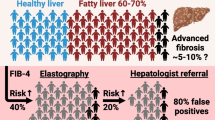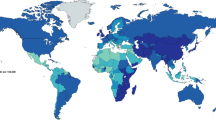Abstract
Background
Recently, many studies have reported that male sex, smoking, fatty liver, metabolic syndrome (MetS), and obesity are risk factors for colorectal neoplasia (CRN). However, current guidelines recommend that persons at average risk of colorectal cancer begin screening colonoscopy at age 50 years without consideration of those risk factors.
Aim
To investigate an appropriate time to start screening colonoscopies in persons with risk factors for CRN.
Methods
We performed a cross-sectional study on 27,894 Korean aged ≥30 years who underwent a first colonoscopy as part of a health screening program. To compare the efficacy of colonoscopic screening for the detection of advanced CRN among age groups with risk factors, we calculated the number needed to screen (NNS) to identify 1 patient with advanced CRN.
Results
The NNS for those 30–39 years old with all risk factors, male gender, smoking (≥10 pack-years), MetS, obesity, and fatty liver, was higher than that for ≥50-year-old female subjects (55.4 vs. 26.4). The NNS for those 40–44 years old with all risk factors (37.1) was also higher than that for ≥50-year-old female subjects. However, the NNS for those 45–49 years old with risk factors (16.9–22.9) was lower than that for ≥50-year-old women.
Conclusions
The efficacy of colonoscopic screening in people 30–44 years old with multiple risk factors is lower than that in ≥50-year-old women. Risk factors such as male sex, smoking, MetS, obesity, and fatty liver do not justify starting screening colonoscopies before age 45.

Similar content being viewed by others
References
Lee BI, Hong SP, Kim SE, et al. Korean guidelines for colorectal cancer screening and polyp detection. Clin Endosc. 2012;45:25–43.
Sung JJ, Lau JY, Young GP, et al. Asia Pacific consensus recommendations for colorectal cancer screening. Gut. 2008;57:1166–1176.
Rex DK, Johnson DA, Anderson JC, et al. American College of Gastroenterology guidelines for colorectal cancer screening 2009 [corrected]. Am J Gastroenterol. 2009;104:739–750.
Lin OS, Kozarek RA, Cha JM. Impact of sigmoidoscopy and colonoscopy on colorectal cancer incidence and mortality: an evidence-based review of published prospective and retrospective studies. Intest Res. 2014;12:268–274.
Kim ER, Kim YH. Clinical application of genetics in management of colorectal cancer. Intest Res. 2014;12:184–193.
Cha JM. Colonoscopy quality is the answer for the emerging issue of interval cancer. Intest Res. 2014;12:110–116.
Botteri E, Iodice S, Raimondi S, et al. Cigarette smoking and adenomatous polyps: a meta-analysis. Gastroenterology. 2008;134:388–395.
Shrubsole MJ, Wu H, Ness RM, et al. Alcohol drinking, cigarette smoking, and risk of colorectal adenomatous and hyperplastic polyps. Am J Epidemiol. 2008;167:1050–1058.
Abrams JA, Terry MB, Neugut AI. Cigarette smoking and the colorectal adenoma-carcinoma sequence. Gastroenterology. 2008;134:617–619.
Okabayashi K, Ashrafian H, Hasegawa H, et al. Body mass index category as a risk factor for colorectal adenomas: a systematic review and meta-analysis. Am J Gastroenterol. 2012;107:1175–1185; quiz 1186.
Jinjuvadia R, Lohia P, Jinjuvadia C, et al. The association between metabolic syndrome and colorectal neoplasm: systemic review and meta-analysis. J Clin Gastroenterol. 2013;47:33–44.
Stadlmayr A, Aigner E, Steger B, et al. Nonalcoholic fatty liver disease: an independent risk factor for colorectal neoplasia. J Intern Med. 2011;270:41–49.
Wong VW, Wong GL, Tsang SW, et al. High prevalence of colorectal neoplasm in patients with nonalcoholic steatohepatitis. Gut. 2011;60:829–836.
Hong SN, Kim JH, Choe WH, et al. Prevalence and risk of colorectal neoplasms in asymptomatic, average-risk screenees 40 to 49 years of age. Gastrointest Endosc. 2010;72:480–489.
Chung SJ, Kim YS, Yang SY, et al. Prevalence and risk of colorectal adenoma in asymptomatic Koreans aged 40–49 years undergoing screening colonoscopy. J Gastroenterol Hepatol. 2010;25:519–525.
Chang LC, Wu MS, Tu CH, et al. Metabolic syndrome and smoking may justify earlier colorectal cancer screening in men. Gastrointest Endosc. 2014;79:961–969.
Jung YS, Ryu S, Chang Y, et al. Risk factors for colorectal neoplasia in persons aged 30 to 39 years and 40 to 49 years. Gastrointest Endosc. 2015;81:637–645.e7.
Grundy SM, Cleeman JI, Daniels SR, et al. Diagnosis and management of the metabolic syndrome: an American Heart Association/National Heart, Lung, and Blood Institute Scientific Statement. Circulation. 2005;112:2735–2752.
Wen CP, David Cheng TY, Tsai SP, et al. Are Asians at greater mortality risks for being overweight than Caucasians? Redefining obesity for Asians. Public Health Nutr. 2009;12:497–506.
Lieberman DA, Rex DK, Winawer SJ, et al. Guidelines for colonoscopy surveillance after screening and polypectomy: a consensus update by the US Multi-Society Task Force on Colorectal Cancer. Gastroenterology. 2012;143:844–857.
Imperiale TF, Wagner DR, Lin CY, et al. Risk of advanced proximal neoplasms in asymptomatic adults according to the distal colorectal findings. N Engl J Med. 2000;343:169–174.
Lieberman DA, Holub J, Eisen G, et al. Prevalence of polyps greater than 9 mm in a consortium of diverse clinical practice settings in the United States. Clin Gastroenterol Hepatol. 2005;3:798–805.
Choe JW, Chang HS, Yang SK, et al. Screening colonoscopy in asymptomatic average-risk Koreans: analysis in relation to age and sex. J Gastroenterol Hepatol. 2007;22:1003–1008.
Cha JM, Kozarek RA, La Selva D, et al. Findings of diagnostic colonoscopy in young adults versus findings of screening colonoscopy in patients aged 50 to 54 years: a comparative study stratified by symptom category. Gastrointest Endosc. 2015;82:138–145.
Author information
Authors and Affiliations
Corresponding author
Ethics declarations
Conflict of interest
There was no conflict of interest.
Rights and permissions
About this article
Cite this article
Jung, Y.S., Yun, K.E., Chang, Y. et al. Risk Factors Such as Male Sex, Smoking, Metabolic Syndrome, Obesity, and Fatty Liver Do Not Justify Screening Colonoscopies Before Age 45. Dig Dis Sci 61, 1021–1027 (2016). https://doi.org/10.1007/s10620-015-3912-5
Received:
Accepted:
Published:
Issue Date:
DOI: https://doi.org/10.1007/s10620-015-3912-5




